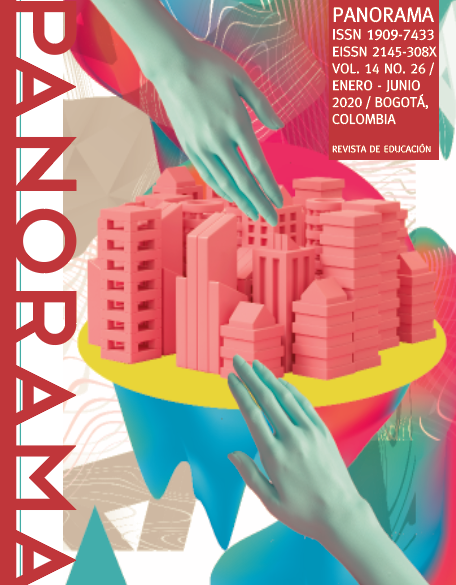Abstract
La práctica pedagógica entendida como una práctica social que adquiere sentido a través de la interacción entre los sujetos y entre estos y su entorno, debe partir del carácter complejo que caracteriza al mundo en el que vivimos. En este sentido resultaría insuficiente y hasta ilógico pensar en una práctica pedagógica estática, lineal y simplista. Por el contrario, la realidad de nuestro entorno insta de prácticas pedagógicas de carácter emergente e incluso irreverente que tengan como ejes centrales el dinamismo, la investigación, la reflexión, la dialogicidad, que religados con los principios de la metacognición formen individuos capaces de auto-dirigir sus propios procesos de aprendizaje y capaces de vivir y desenvolverse en una sociedad permeada por la complejidad.
References
Berstein, B. (1998) Pedagogía, control simbólico e identidad. Teoría, investigación y crítica, Morata, Madrid, 1998
Bourdieu, P. (1987). Los tres estados del capital cultural (Trad. M. Landesmmann). Sociológica, 2 (5). 11-17.
Carr, W & Kemmis, S (1988) Teoría Critica de la Enseñanza. La investigación-acción en la formación del profesorado. Ediciones Martínez Roca.
Carretero M. (2001). Metacognición y educación. Aique.
Cerdá M., A.D: (2001). Nosotros los maestros, Concepciones de los docentes sobre su quehacer. Universidad Pedagógica Nacional, México
Elliot. J. (1998). La investigación Acción en Educación. Segunda Edición Morata
Flavell, J. H. (1976). Metacognitive aspects of problem solving. En: L. B. Resnik (ed.). The nature of intelligence (pp. 231-235). Hillsdale, N.J.: Erlbaum.
Foucault, M. (1969). La Arqueología del saber. Editorial Siglo XXI
Freire, P (1982) La educación como práctica de la libertad. Ediciones Siglo XXI, Brasil.
Giddens, A (1986) La constitución de la sociedad: Bases para la teoría de la estructuración. Amorrortu-editores. Buenos Aires, Argentina
Glaser, R. (1994). Learning theory and instruction. En: G. D'Ydewalle, P. Eelen y B. Bertelson (eds.). International perspectives on psychological science. (Vol. 2) NJ: Erlbaum
González, J. (2018) Pensamiento Religado: Pensar para religar. Prisa Ediciones.
González, N., & Zerpa, M., & Gutierrez, D., & Pirela, C. (2007). La investigación educativa en el hacer docente. Laurus,13 (23), 279-309.
Gramsci, A (1973) La alternativa pedagógica. Nova Terra.
Lewin, K. (1946), Action Research and Minority Problems. Journal of Social Issues, 2: 34-46. https://doi.org/10.1111/j.1540-4560.1946.tb02295.x
Lin, X. D. (2001). Reflective adaptation of a technology artifact: A case study of classroom change. Cognition & Instruction, 19, 395–440.
Morín, E. (2000). Los siete saberes necesarios para la educación del futuro. Ministerio de Educación Nacional. Bogotá. Colombia.
Rockwell E. & Ezpeleta J. (1986). La escuela, relato de un proceso de construcción inconcluso. Documento DIE 1. México: IPN
Rockwell E. & Mercado, R. (1989). La escuela, lugar del trabajo docente. Descripciones y debates. México: Cuadernos de Educación. DIE / CINVESTAV / IPN
Saker, J. & Correa, C. (2015) Saber y Práctica Pedagógica: Aulas abiertas a la investigación educativa. Ediciones, Universidad Simon Bolivar.
Stenhouse, L. (1993): La investigación como base de la enseñanza. Ediciones Morata.
Tamayo, J. (2017) La práctica pedagógica como categoría de análisis: Acercamientos desde su construcción como objeto de investigación. Congreso Nacional de Investigación Educativa. San Luis, Potosí, México.
Vasco, C (1990) Reflexiones sobre pedagogía y didáctica. Serie pedagogía y currículo. Ministerio de Educación Nacional, Republica de Colombia.
Zuluaga, O. (1999). Pedagogía e Historia. La historicidad de la pedagogía, la enseñanza, Un objeto de saber. Siglo del Hombre Editores, Anthropos, Editorial Universidad de Antioquia.
Zuluaga, O., Echeverri, A., Martínez, A., Restrepo, S., & Quiceno, H., (2011) Educación y Pedagogía: Una diferencia Necesaria. En: O. Zuluaga, A. Echeverri, A. Martínez, H Quiceno, J. Sáenz, & A. & Álvarez (Ed.) Pedagogía y Epistemología (pp. 21-40). Bogotá, Colombia: Editorial Magisterio.

This work is licensed under a Creative Commons Attribution-NonCommercial-NoDerivatives 4.0 International License.
Copyright (c) 2020 Panorama





